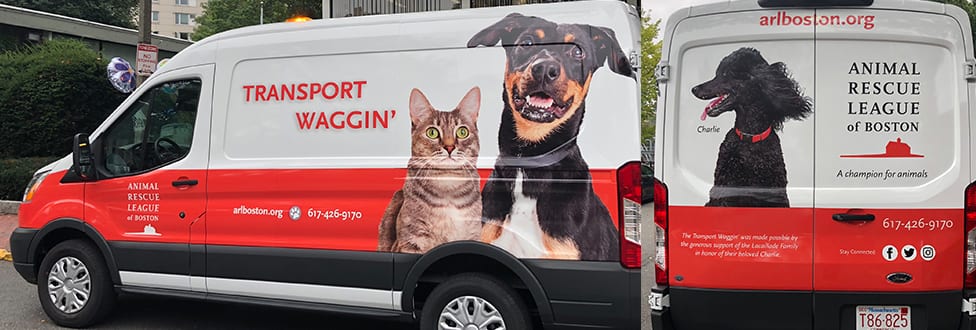ARL Unveils New Transport Waggin’
Thousands of animals to benefit from mobile unit
With Animal Care and Adoption Centers in Boston, Dedham and Brewster, the Animal Rescue League of Boston (ARL) provides medical and behavioral care and adoption services for thousands of animals annually (over 18,000 in 2017), and these animals arrive at ARL in a number of ways. Owner surrenders, strays, out-of-state transports, rescues, and law enforcement cases; ARL also routinely assists local municipal and private shelters with transfers and we unfortunately also respond to large overcrowding and cruelty situations as well.
But no matter how they arrive, the goal for every animal is the same: that they are safe and healthy and returned to habitats and homes.
Each of ARL’s locations has different characteristics (urban vs. rural) and capabilities i.e. surgical suites and barns/paddocks for farm animals. Moving animals to the location that’s best suited for their needs has historically been a logistical challenge — until now.
With a most generous donation from Leadership Council members, Connie and Peter Lacaillade, ARL has purchased, outfitted and staffed a new Transport Waggin’.
Linking ARL’s locations, programs and resources, the Transport Waggin’ will serve animals and communities in a variety of ways including:
- Ensuring proper medical care: If a shelter animal requires specialized diagnostics, surgery, or constant veterinary supervision, they have access to the care they need.
- Matching animals with adopters more quickly: Animals may be overlooked by adopters in one Adoption Center base on their size, temperament or needs, so a change in location can be beneficial.
- Enhancing behavior and enrichment: Different ARL Adoption Centers offer different volunteer expertise and amenities, like outdoor runs.
- Allowing ARL to help out-of-state animals: ARL receives regular transports from high-kill areas of the country and Puerto Rico. These life-saving transports broaden ARL’s reach in helping animals in need, while meeting local adoption needs.
- Increasing ARL’s ability to be a community resource: ARL can better assist municipal shelters, animal control facilities, and smaller rescue groups in transporting animals to get the care they need.

